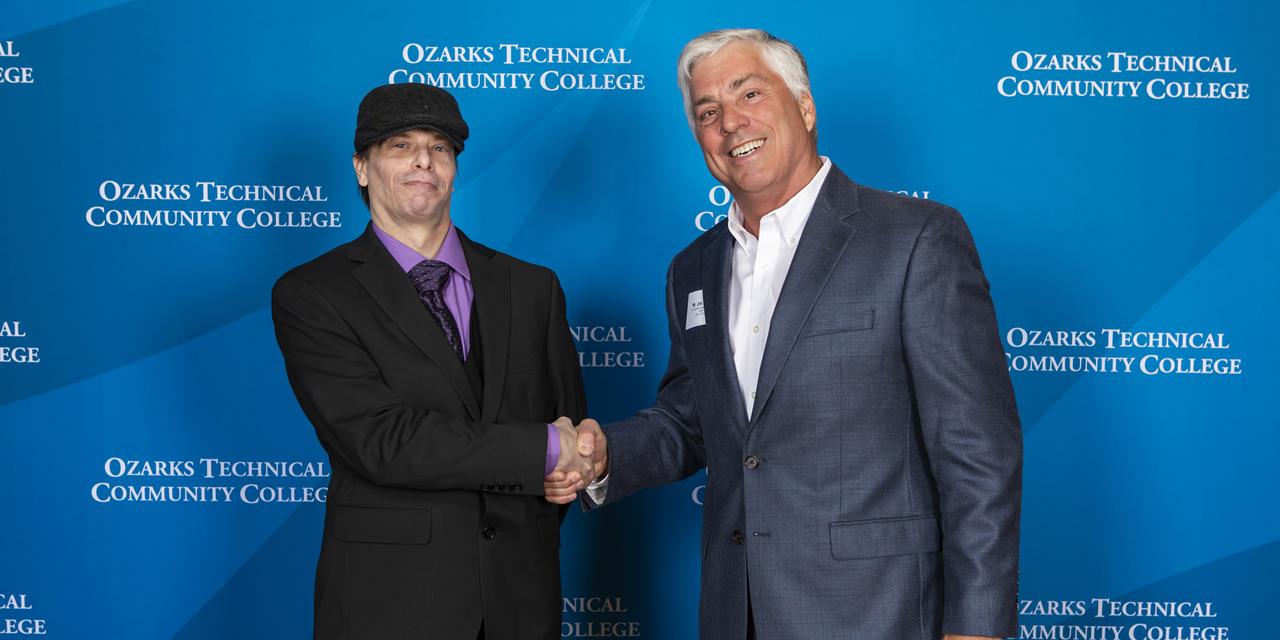Photo: Lee Brubaker (left) with OTC Donor Jim Towery.
As a chef, Lee Brubaker’s favorite dish is Brandied Potatoes. He sautés potatoes, onions and rosemary in butter and olive oil before flambéing the mixture with brandy.
Now, brandy potatoes are something Lee only makes for friends and family. His new career involves analyzing DNA in the search for a cure for cancer. He made the career change after attending Ozarks Technical Community College.
Growing up in Moline, Ill., Lee did not consider attending college. He wanted to become a chef.
“I worked at a high-end restaurant in my hometown during high school,” Lee said. “I got along well with the chefs and wanted to pursue a culinary career.”
Lee graduated from high school in 1989 and moved to Kansas City, where he became the executive chef at a prominent jazz club. He progressed through his career and was working in Des Moines, Iowa, in 2015 when his grandmother had a stroke.
“She lived in Walnut Shade near Branson and needed someone to care for her,” Lee said. “I moved there and served as her dietician and caretaker.”
In 2017, Lee started driving from Walnut Shade to Springfield to take classes at OTC. At first, he studied culinary but quickly switched his major.
“I fell in love with biology and microbiology and changed my major to biological clinical science,” Lee said. “I’ve always loved science, even as a kid.”
Lee definitely has a knack for the subject. As an OTC student, he designed a hypothesis for a novel gene theory to treat Duchenne Muscular Dystrophy, the disease’s most aggressive form. His premise gained significant attention. In 2017, he exhibited a poster presentation of his hypothesis at the National Organization for Rare Diseases (NORD) Conference. From there, Lee was encouraged to apply for grants to fund a study of his hypothesis — even the British Royal Family’s Foundation.
“Lee was always a kind and caring man who wanted to do something significant in medical research,” said Richard Wells, Lee’s anatomy and physiology instructor. “He was intelligent, and it’s gratifying to see that he found his passion while attending OTC.”
While Lee did not secure funding for his research, he made many friends in the world of Muscular Dystrophy research. He even gave his proposal and research to another researcher and told him to use it to help kids.
Lee completed his biological clinical science associate degree in 2019 and transferred to Missouri State University, where he earned a bachelor’s in cell and molecular biology in 2022.
Once his grandmother’s health challenges advanced and she required care in a nursing home, Lee began looking for work in the field of scientific research. In March of this year, Lee landed a job as a clinical laboratory scientist at Exact Sciences in Madison, Wisc.
“I extract DNA and analyze it for genetic biomarkers that might indicate cancer,” Lee said. “Exact Sciences is a great place to work, and I’m proud of what we do.”
Lee has experienced several career changes over the last decade. From executive chef to a full-time caretaker and now a cancer researcher, Lee is rolling with the changes and even sees his current role as a form of service.
“I figure, if I can help people, I should help them,” Lee said.

